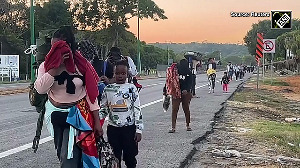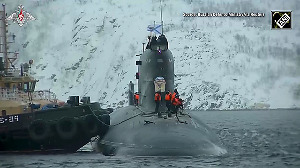On August 13, when the United States and the European Union buried their differences and unveiled their joint framework for agricultural negotiations at the World Trade Organisation in Geneva, almost all other members of the WTO were shaken.
The joint EU-US position paper revived memories of the Uruguay Round negotiations when the two joined hands to extract the maximum from the developing and least developing countries who were still groping in the multilateral world.
The joint paper had its effect in Delhi as well. Commerce ministry officials were at a loss to explain the sudden development, particularly when India and the EU had been on the same side as far as market access was concerned.
In Geneva, India permanent representative to the WTO, K M Chandrasekhar, swung into action the moment the US and EU's intentions became clear.
Along with the Brazilian and the Argentinean ambassadors, he put together a coalition of 17 developing countries, which also consisted of heavyweights like China and South Africa. The new grouping, whose membership base has increased to 20, now, also had some members from the Cairns group supporting India.
The fact that India was able to play a prominent role in opposing the EU-US pact has much to do with Chandrasekhar. "He has wide acceptance in Geneva. He is very popular with other delegations and highly respected in the WTO secretariat," said a commerce ministry official.
Even Commerce and Industry Minister Arun Jaitley rates the 1970 batch IAS officer highly. "My role was only to give clearance [for the G20 paper] over the phone, the rest of the work was done by our delegation in Geneva," he said.
Chandrasekhar belongs to the new breed of Indian officials who have been closely associated with the Uruguay Round negotiations by virtue of their relationship with the commerce ministry.
They are better prepared and equipped to handle the complex nuances of current WTO issues. EU Trade Commissioner Pascal Lamy, himself a famously tough negotiator, was all praise for Indian negotiators saying they were "extremely good at tactics".
During the Uruguay Round talks, the Kerala cadre officer was the chairman of the Spices Board, which provided him with a background in agriculture and commodities.
In 1997, Chandrasekhar joined the commerce ministry's trade policy division, which deals with multilateral negotiations. "Since he was in the ministry when the groundwork for the Doha round of talks were being done, he is extremely conversant with the nuances of the issues," said an official.
In 1999, he moved to Brussels in the Indian embassy and learnt the tricks of negotiations with the EU. Until the Doha ministerial meeting 2001, India and the EU's relationship were more strained and it was only after Doha that the EU softened its posture so that India reduced its opposition to the Singapore issues comprising investment, competition policy, trade facilitation and government procurement.
Soon after the Doha ministerial, Chandrasekhar moved to Geneva in India's Permanent Mission to replace S Narayanan in a job that many, particularly foreign service officers, were eyeing.
Those in Geneva say that Chandrasekhar has built a large support base for India's position on various issues, a tough task given that every country has a different position on each subject. "Dealing with a situation like that can be very tricky. You have to be vocal as well as sensitive to the concerns of the other member, since the same country could be a coalition partner on another issue," explained an official.
Chandrasekhar's stiff and vocal resistance often finds mentions in dispatches by NGOs from Geneva. One such web newsletter mentioned that WTO Director General Supachai Panitchpakdi had to ask the Indian ambassador to let the others present their case as well, indicating the high-pitched opposition that was being put up.
Unlike his predecessor, however, Mike Moore, Panitchpakdi has not called up India's commerce minister to lodge a complaint against the delegation. Chandrasekhar is also popular among the Geneva correspondents who refer to him as "dial-a-quote" - though he did not respond to requests for a photograph for this article.
Some officials said Chandrasekhar is partly reaping the rewards of Narayanan's groundwork before the Doha ministerial. It is not yet clear whether Chandrasekhar, an additional secretary-level officer, will move out of Geneva on promotion to secretary. A lot will depend on how good his groundwork for the Cancun ministerial, starting on Wednesday, has been.





 © 2025
© 2025